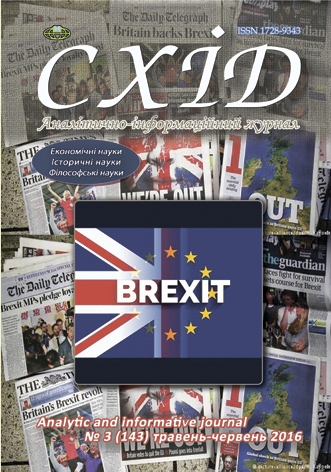Wagner discourse of contemporary philosophy: Alain Badiou vs Philip Lacou-Labarthe
DOI:
https://doi.org/10.21847/1728-9343.2016.3(143).74850Keywords:
philosophy of music, deconstruction, discourse, aesthetics, politics, ideologyAbstract
The article focuses on reconstructing the structures of implicit criticism on postmodern understanding of music, found within the discourse of a dispute between Alain Badiou and Philip Lacou-Labar the concerning philosophical interpretation of Richard Wagner's musical works. It was revealed that A. Badiou proposes a program to overcome the characteristic deconstructivist reduction of art to politics that brings the former to another by-product of ideology. Negative conceptual apparatus of deconstruction is opposed by A. Badiou with a hermeneutics, characterized by affirmative morphology and syntax constituted onto the pragmatics of a lesson, teaching action, open gesture of involvement.
Badiou si an approach marks a good possibility of overcoming the methodological and ideological deadlock of postmodernity. This new wave of philosophical debates around Richard Wagner responds to the revival of grand epical genres in mass culture. Consequently a new dialectical thinking must be taught in order to continue the tradition of critical approach to culture. This is the key implication of A. Badiou's lessons on how it is possible to rethink the works of art and historically determined approaches to understanding them besides the clich?s of the recent postmodernist legacy. Although Badiou's critique itself can be seen as a kind of postmodernist interpreting technique, the French philosopher manages to escape the overt radicalism of postmodernist claims against Wagner by means of true radicalityof affirmative interpretation inspired not by suspicion of a concealed truth but rather a commitment to a truth to come.Downloads
References
Wagner R. (1978), Selected works, Iskusstvo, Moscow, 695 p. (rus).
Lacou-Labarthe Ph. Musicaficta: Figures of Wagner, Aksioma, Saint-Peterburg, 1999, 224 p. (rus).
Adorno Th. (2005), In search of Wagner, Verso, London, 148 p. (eng).
Badiou A. (2010), Five lessons on Wagner, Verso,London, 256 p. (eng).
Cachopo J. P. (2014), The case of Wagner against the grain: the disagreement between Nietzsche and Adorno, and its relevance today, Parrhesia, Number 19, 36-50 pp. (eng).
Kane B. (2013), Badiou's Wagner: Variations on the Generic, The Opera Quarterly, № 3-4 (Vol. 29), р. 349-354 (eng). doi: 10.1093/oq/kbt030
Lee Sh. (2010), ‘Alles, was ist, endet:’ On dramatic text, absolute music, Adorno, and Wagner’s Ring, University of Toronto Quarterly, Volume 79, Number 3, 922-940 pp. (eng). doi: 10.3138/utq.79.3.922
Oenen van G. (2012). Wagner’s case re-opened, Krisis: Journal for contemporary philosophy, Issue 1, 90-93 pp. (eng).
Scherzinger M. (2012), Wagner redux: Badiou on music for the future, Contemporary Music Review, Vol. 31, Nos. 5-6, рр. 461-485 (eng). doi: 10.1080/07494467.2012.759416
Vaki F. (2013), Adorno and Badiou on “the case of Wagner:” a new experience of time?, in: Time theories and music conference: proceedings, Ionian University, Corfu, 1-9 pp. (eng).
Zizek S (2010), Afterword: Wagner, anti-Semitism and ‘German ideology’, in: Badiou A. Five lessons on Wagner, Verso, London, 162-225 pp. (eng).
Zizek S. (2006) The politics of redemption, or, why Richard Wagner is worth saving, in: Lacan: the silent partners, Verso, London, 231-269 pp. (eng).
Downloads
Published
How to Cite
Issue
Section
License
Copyright (c) 2016 Olena Karpenko

This work is licensed under a Creative Commons Attribution-NonCommercial-NoDerivatives 4.0 International License.
1. Authors bear responsibility for the accuracy of facts, quotations, numbers and names used.
2. Manuscripts are not sent back.
3. The publisher does not always agree with the authors' opinion.
4. The authors reserve the right to authorship of the work and pass the first publication right of this work to the journal under the terms of a Creative Commons Attribution-NonCommercial-NoDerivatives 4.0 International License. This license allows others to distribute (copy) the published work for non-commercial purposes, provided there is mandatory attribution to its authors and a link to the first publication in our journal.
5. The authors have the right to conclude separate supplement agreements that relate to non-exclusive work distribution in the form in which it has been published by the journal (for example, to upload the work to the online storage of the journal or publish it as part of a monograph), provided that the reference to the first publication of the work in this journal is included.

